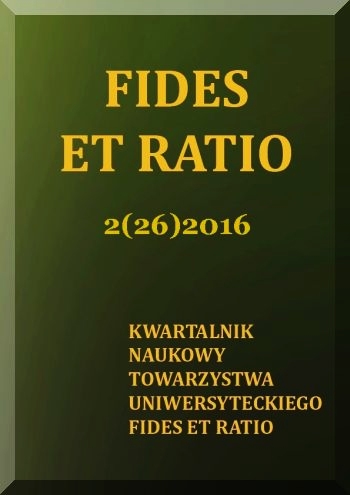Abstract
The purpose of this paper is to present the issue of forgiveness in the thought of the French philosopher Paul Ricoeur. The author raised this problem in his late work Memory, History, Oblivion, however the earlier studies constitute the anthropological preparing for exploring the question of forgiveness. At first two main phenomena are exposed: fault and forgiving. They determine specific relation that Ricoeur defines as an “equation of forgiveness”. This relation has vertical character – the depth of fault is confronted with the height of forgiveness. The philosopher examines also the social dimension of fault, trying to detect the possibility of forgiveness. He talks about the criminal, political and moral fault. However in the terms of institution the fault remains inexcusable and certain gestures, e.g. respect towards the guilty, are only a weak approximation of the forgiveness. Ricoeur examines also the horizontal relation between the request for forgiving and granting it, asking if the reciprocity is here possible. The problems with forgiving to yourself shows the weakness of this solution. The enigma of forgiving is lighten finally by the relation between the subject and his act. The essence of the forgiveness is to deliver the subject form his act, as says the formula: “you are worth more than your acts”.
References
Derrida J., (1999), Le siècle et le pardon, (w:) Le Monde des débats, Décembre 1999.
Drwięga M., (1998), Paul Ricoeur daje do myślenia, Bydgoszcz: Wydawnictwo homini.
Grondin J., (2013), Paul Ricoeur, Paris: PUF.
Jankélévitch V., (1986), L’imprescriptible, Paris: Éditions du Seuil.
Jervolino D., (1995), L’Amore difficile, Roma: Edizioni Studium.
Lévinas E., (2004), Cierpienie bezużyteczne, tłum. A. Kowalska, (w:) Literatura na świecie, nr 1-2/2004.
Lévinas E., (2006), Istniejący i istnienie, tłum. J. Margański, Kraków: Wydawnictwo homini.
Lévinas E., (2004), Kilka uwag o filozofii hitleryzmu, tłum. J. Migasiński, (w:) Literatura na świecie, nr 1-2/2004.
Lorenc W., (2003), Hermeneutyczne koncepcje człowieka. W kręgu inspiracji heideggerowskich, Warszawa: Wydawnictwo Naukowe Scholar.
Lubowicka G., (2000), Sumienie jako poświadczenie. Idea podmiotowości w filozofii Paula Ricoeura, Wrocław: Wydawnictwo Uniwersytetu Wrocławskiego.
Mazzù A., (2013), Identité, histoire intérieure de vie et ipse, (w:) L’Éthique et le soi chez Paul Ricoeur, red. Canivez P., Couloubaritsis L., Lille: Presses Universitaires du Septentrion.
Ricoeur P., (1992), Filozofia osoby, tłum. M. Frankiewicz, Kraków: Wydawnictwo Naukowe Papieskiej Akademii Teologicznej w Krakowie.
Ricoeur P., (2002), Lectio magistralis (w:) D. Jervolino, Paul Ricoeur. Une herméneutique de la condition humaine, Paris: Ellipses.
Ricoeur P., (2007), Pamięć, historia, zapomnienie, tłum. J. Margański, Kraków: Universitas.
Ricoeur P., (1950), Philosophie de la volonté: I. Le volontaire et l’involontaire, Paris: Aubier.
Ricoeur P., (1960), Philosophie de la volonté: II. Finitude et culpabilité: 1. L’homme faillible, 2. La symbolique du mal, Paris: Aubier. Po polsku ukazała się jak dotąd tylko druga część drugiego tomu Filozofii woli: Ricoeur P., (1986), Symbolika zła, tłum. S. Cichowicz, M. Ochab, Warszawa: IW PAX.
Ricoeur P., (1990), Soi-même comme un autre, Paris: Éditions du Seuil. Wydanie polskie: Ricoeur P., (2005), O sobie samym jako innym, tłum. B. Chełstowski, Warszawa: PWN.
